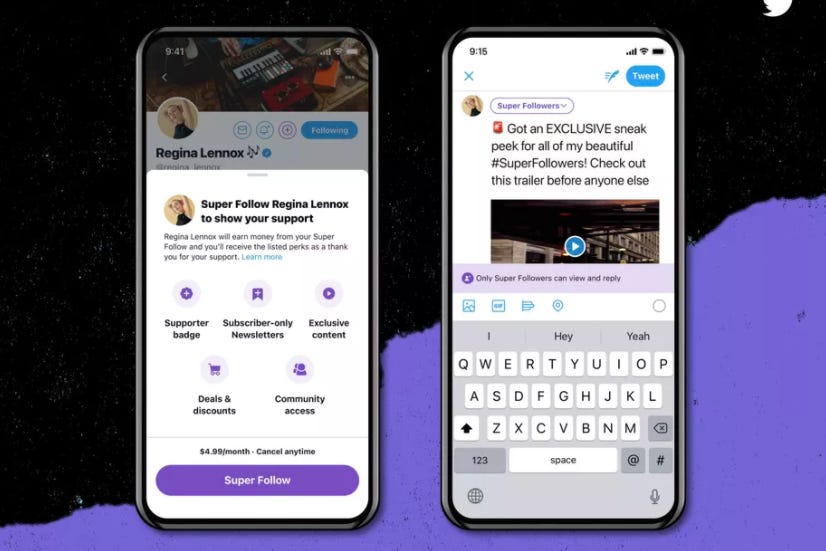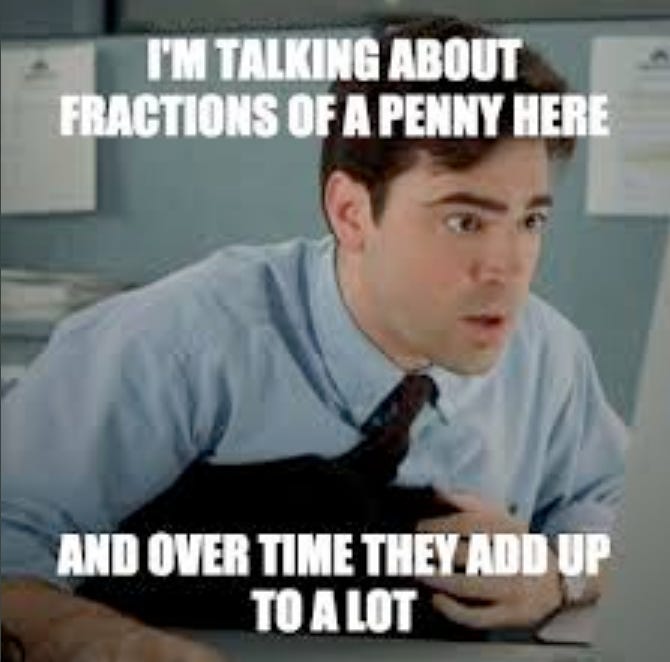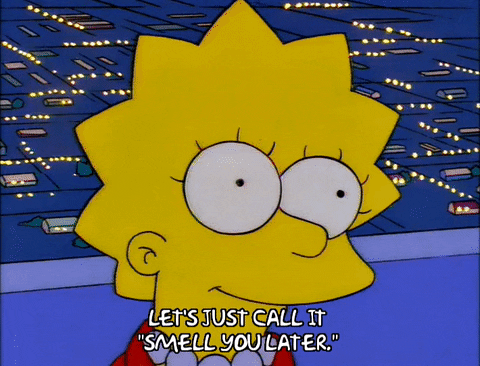The “creator economy” got a boost yesterday, after Twitter announced at a virtual event that it was building out features to let people charge certain followers bonus content. Calling this new user-base, “Super Follows,” Twitter is opening the door for people to make money off their content.
No longer will we be able to say, “I cannot believe this website is free.”
With Super Follows, Twitter will allow users to make money from content that they make exclusive to particular followers. Sample screenshots released by the company show that the payment scheme could take multiple forms. For instance, a follower could pay a creator they follow on Twitter a few dollars a month to access that user’s exclusive newsletter or to see special tweets only available to Super Followers. They might also be able to join a particular group or access a badge that shows they support that creator.
(Image via Twitter)
With the rise of the solo content practitioner—from Patreon to Substack to YouTube—it perhaps shouldn’t be a surprise that Twitter sees (perhaps incremental) revenue opportunities. If they take a percentage of a cut of each Super Follow payment, the company can play the Office Space game, where a penny here, a penny there, and with a few hundred million users, adds up pretty quickly.
But I worry that it’s just another wedge between the haves and the have-nots. We are drowning in content right now, between all the streaming services and news subscriptions and social platforms, at some point it might become cost prohibitive for folks. But I guess if one really wants to get that extra content they’ll pay for it.
People won’t pay for news (sure, the New York Times can boast of huge subscriptions, but how about all the local papers?) but will they pay to read someone’s tweets? Will people add this expense on top of all their other content? Will they pay for these tweets instead of a subscription to a news outlet? Of course, like every answer in media, “it depends.”
And paying for the privilege to read tweets, especially for media outlets, raises some questions: Will media companies ask folks to pay for additional tweets, perhaps info that wasn’t in a story? Will people pay media companies for these tweets, only to get hit with a paywall on site?
What about reporters: will they get a percentage of the pay-for-tweet if a media company uses their story for their Super Follow tweet? One way of looking at this: Twitter just gave yet another tool for reporters to shed their corporate overlords. As Twitter exists as a digital playground for reporters, I can see a world where the “star” reporters, those who have hundreds of thousands of followers, use the combination of Super Follow and newsletter to earn a living.
And that’s where I can see the have vs. have-nots argument really taking shape. The unintended consequences of turning journalists into a brand, arguably started by and because of Twitter, will continue to cause ripple effects, both large and small, across the media landscape.
Lots of questions, and, as the cliche goes, only time will tell.
So now I come to some ~professional~ news.
As of March 8, I will be an executive editor at Morning Brew, overseeing the company’s three B2B newsletters, Marketing Brew, Retail Brew, and Emerging Tech Brew. It’s been a long year for everyone, and I am very happy to be joining a phenomenal company at an important moment.
Every one of us has had to carry unimaginable loads of stress—whether it’s juggling working remotely and parenting, or being isolated from friends or family, or navigating the byzantine health system after coming down with the coronavirus, or any of a million other stressful moments—and through all of this, I considered myself lucky. Sure, not having a job meant not having income, but it also meant not having a sense of self-worth; and applying to way too many jobs, interviewing—in several cases, five rounds and many memos—has been a struggle.
But I have my health, my family, my friends, and, well, you.
Over the last 10 months (in fact, tomorrow is exactly 10 months from when I started this experiment), 3,764 of you subscribed (well, it’s more than that as many have unsubscribed, too) to this little newsletter. And during this time, I wrote 190 editions. Some good, some not. But what I loved the most: the emails from you after each issue. I’ve learned so much, and will continue to learn.
As for the future of The Media Nut, I’ll be taking my foot off the gas pedal a bit with the goal of putting out a weekly edition.
I cannot say how grateful I am that you’ve allowed me in your inbox, every day for the last 10 months. Please continue to send me your tips and thoughts. Have a restful, relaxing and safe weekend. This isn’t goodbye, but:
Some interesting links:
For potential problematic situations:
New York Times Columnist David Brooks Wrote A Blog Post For Facebook’s Corporate Website (BuzzFeed News)
What Happens When Facebook Slows the News Flow (WSJ)
Email is making us miserable (The New Yorker)
For earnings:
Gannett beats estimates for its 4Q results amid growing digital subscriptions and lower costs (Gannett)
AMC Networks Swings to Q4 Profit on Streaming Gains (Variety)
For managing digital subscriptions:
The Arizona Republic considers killing “zombies” a staple of its digital subscription strategy (Better News)
For P.R. platforms getting bigger:
Brandwatch is acquired by Cision for $450M, creating a PR, marketing and social listening giant (TechCrunch)
For something I truly don’t understand:
White House and press are at odds over plan to charge reporters for coronavirus testing (WaPo)
For tech companies needing to fix race problems:
Bias, disrespect, and demotions: Black employees say Amazon has a race problem (Recode)
For big companies looking to shake things up a bit:
Walmart, one of the biggest advertisers, is shopping for a new agency to handle its US ad business (Insider)
For media criticism:
What Happens When Local News Erases Black Stories? (Men Yell At Me)
For exit interviews:
“You’ve made The Post swashbuckling once again”: Marty Baron receives a star-studded farewell and dishes in a wide-ranging interview (Vanity Fair)
For light at the end of the tunnel:
Live Nation CEO Michael Rapino Says Largescale U.S. Concerts Could ‘Start in Midsummer’ (Spin)







Congrats!
Congrats on the new gig!